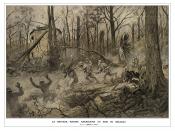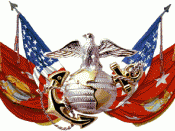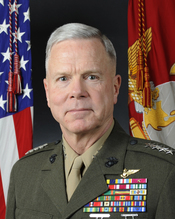Loyalty: A Cornucopia of Ideals By: MIDN 1/C Molly Johnson In William Styron's The Long March, the leadership traits that our Armed Forces strive to attain are seen in both obvious and not so obvious illustrations. One of the most important of these leadership traits is loyalty. In The Long March, all the characters showed a loyalty of some kind - some to their country, some to their Marine Corps, some to themselves. An interesting conflict of loyalty occurred, however, through Sgt O'Leary and Col Templeton. Although both men held a loyalty first and foremost to the United States Marine Corps, upon closer inspection it is seen that these loyalties held distinct differences in their roots.
Sgt O'Leary held a deep love of the Marine Corps. He was a regular enlisted man whose career and life ambitions were one in the same - to be a United States Marine.
This is a loyalty not uncommon in soldiers throughout the history of the Marine Corps. Sgt O'Leary had an ultimate respect and devotion to his Corps and to his leaders within the Corps.
Sgt O'Leary did not question the orders he received, nor did he question the men who passed them down. This loyalty was seen in Sgt O'Leary on several occasions, but none so poignant as when he was marching alongside LT Culver towards the end of the long walk. It was here that his absolute loyalty to the Marine Corps and to his chain of command was seen most clearly. He was defending Col Templeton's decision to carry out that excruciating march as well as the Commanding Officer's leadership styles and his examples. Sgt O'Leary was not defending and supporting all of this because he liked Col Templeton as a man or because he was trying to...


